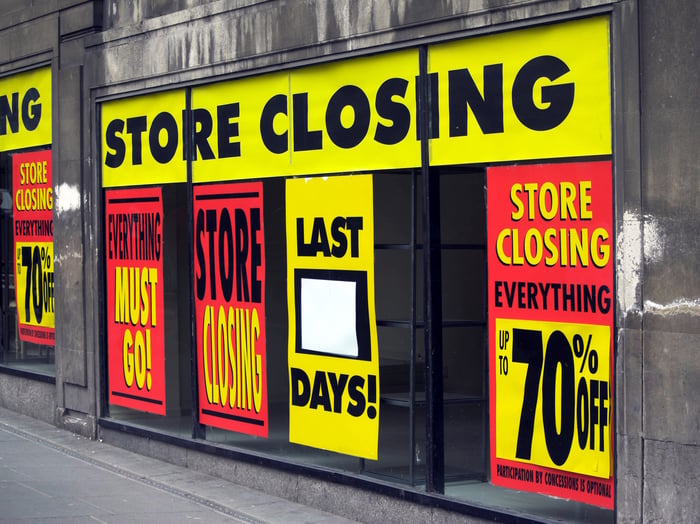It's easy to blame an uptick in store closures on the COVID-19 pandemic. When the outbreak first erupted in early 2020, non-essential retailers were forced to shutter temporarily, and that's a blow many never managed to recover from. The pandemic also fueled a surge in online shopping, so much so that it prompted some retailers to shut down underperforming locations and focus their efforts on improving their digital offerings instead.
The reality, though, is that stores were shuttering even before the pandemic was on anybody's radar. And while 2021 saw fewer closures than 2020, it's fair to say that real estate investors still have plenty to be worried about in this regard.

Image source: Getty Images.
But will 2022 be a brutal year on the store closure front? Here's what we think.
Closures could continue, but the pace may slow
In 2020, 40 major retailers filed for bankruptcy, reports real estate data firm CoStar Group. And last year, more than 11,000 stores closed their doors for good.
Things have looked better in 2021. So far, only about 2,900 stores have closed as of this year's third quarter, reports the National Retail Federation. And what's just as substantial is that there have been over 5,700 store opening announcements during that same time frame.
Going into 2022, we should expect a similar pattern -- one where closures ensue but don't get anywhere close to the extreme levels we saw in 2020. And we could see a number of store openings, especially among discount and off-price chains.
But while store closures may not be as numerous in 2022, they could still deal a harsh blow to real estate investors -- particularly those invested in shopping centers and malls. At this point, many of these properties are dealing with vacancies, a large number of which may have been spurred by the pandemic. And so at a time when shopping center and mall operators are searching for new tenants, losing existing tenants could be brutal.
Malls may be especially apt to struggle in the coming year as more brands try their luck with stand-alone locations. A number of well-known names in the retail space are already making plans to go off-mall, and that could hurt properties that already desperate for foot traffic.
Compounding the issue is the rate at which digital shopping has been picking up. As that trend continues, retailers may opt to shutter less profitable locations and sink resources into warehouses and fulfillment centers instead.
Should real estate investors be worried?
Those invested in shopping centers and mall REITs (real estate investment trusts) shouldn't necessarily rush to cash out their holdings and cut their losses. This year, many retailers found themselves operating in recovery mode following the brunt of the pandemic. Next year, we could see retailers get more innovative in an effort to draw in more customers.
That could mean redesigning stores to make consumers feel safer in public places. It could also mean expanding options for in-store and curbside pickup, offering more choices for self-checkout -- a common feature in grocery stores already -- and allowing contactless payments.
All told, a lot could change in 2022 with regard to consumer habits. And if retailers are able to get creative, we could see even fewer store closures in the coming year than in 2021.






